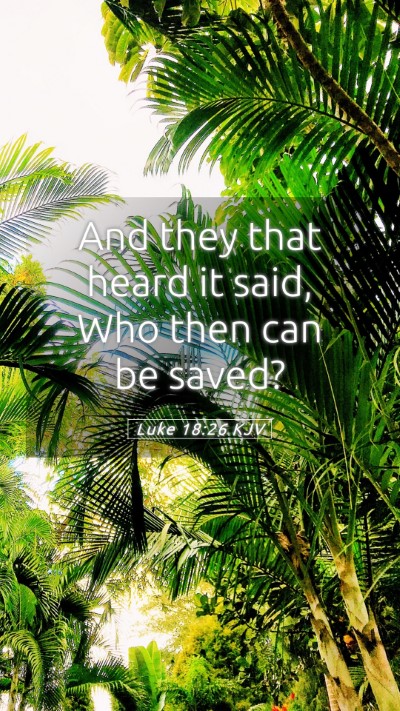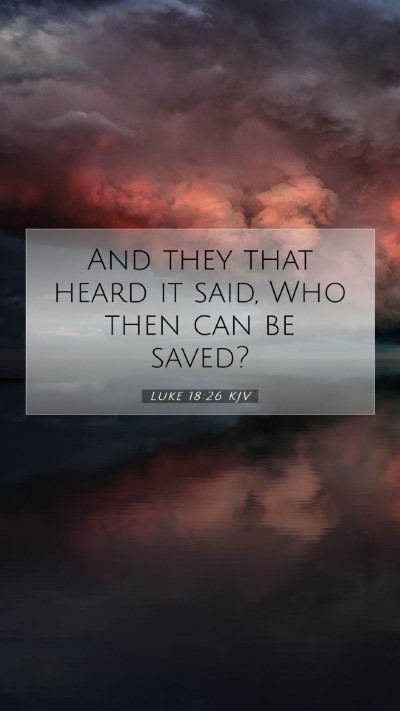Understanding Luke 18:26: A Comprehensive Commentary
Bible Verse: Luke 18:26 - "And those who heard it said, 'Then who can be saved?'"
Introduction
This verse appears within a broader discourse where Jesus discusses the challenges of riches and the nature of salvation. The question posed by those listening reflects a common concern about the feasibility of salvation, particularly for the wealthy.
Bible Verse Meaning
The query, “Then who can be saved?” indicates the listeners' astonishment at Jesus' teachings concerning wealth and the kingdom of God. It highlights an essential confusion that arises when spiritual matters intersect with worldly wealth.
Insights from Public Domain Commentaries
-
Matthew Henry:
Henry emphasizes that the crowd's bewilderment stems from their understanding of salvation and societal norms regarding wealth. In their view, wealth was often seen as a sign of God's favor, making the prospect of a wealthy individual struggling to attain salvation particularly perplexing.
-
Albert Barnes:
Barnes elaborates on the notion that this question reveals a lack of understanding about the nature of salvation. He points out that the disciples and the crowd thought that human merit, including wealth, played a crucial role in their standing before God, thus making them doubt their own salvation prospects.
-
Adam Clarke:
Clarke focuses on the cultural backdrop of the time, highlighting that many believed a prosperous life equated to righteousness. Therefore, the realization that even the wealthy could struggle to enter the kingdom of God shocked the audience and prompted their questioning.
Key Themes
This verse encapsulates several critical themes in biblical discourse:
- The Challenge of Wealth: The difficulty the wealthy face is not merely economic; it signifies a distraction from spiritual priorities.
- Human Despair: The utterances of the crowd resonate with despair. They reflect a common human dilemma: understanding our needs versus the divine will.
- Divine Capability: Ultimately, this verse sets the stage for the next verse, where Jesus emphasizes God’s power in the salvation process.
Application in Life
This verse calls for reflection in several ways:
- Wealth and Responsibility: Believers are challenged to reevaluate their relationship with wealth and consider how it impacts their spiritual life.
- Faith and Trust: The passage encourages readers to affirm that salvation is truly a matter of divine grace, not human capability.
- Community Reflection: This questioning dynamic encourages both individual and communal study of what it means to be saved and how societal norms influence this understanding.
Cross References
This verse connects well with several other scriptures that discuss the nature of salvation and wealth:
- Matthew 19:24 - "Again I say to you, it is easier for a camel to go through the eye of a needle than for a rich man to enter the kingdom of God."
- Mark 10:26 - "And they were greatly astonished, saying among themselves, 'Who then can be saved?'
- Ephesians 2:8-9 - "For by grace you have been saved through faith, and that not of yourselves; it is the gift of God, not of works, lest anyone should boast."
Conclusion
Luke 18:26 offers a profound insight into the paradox of salvation amidst wealth. By capturing the astonishment of the crowd, this verse addresses the broader implications of earthly possessions versus spiritual wealth. As modern readers engage with this scripture, it serves not only as a historic lesson but also as a contemporary call to self-reflection and understanding within Bible study groups.
Further Study Resources
For deeper examination of this verse, consider utilizing the following:
- Bible study tools and resources that facilitate in-depth analysis.
- Join online Bible study groups for collective exploration.
- Access Bible study guides that focus specifically on the teachings and parables of Jesus.


